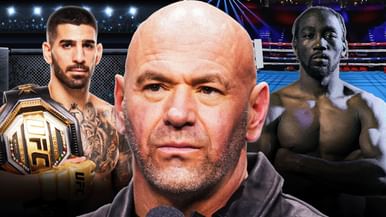
In a major announcement yesterday, the UFC have confirmed that Dustin Poirier and Conor McGregor will face off for a third time in the main event of UFC 264.
When Conor McGregor faced Dustin Poirier at UFC 257, he suffered the first knockout loss of his career – so could UFC 264 mark the end for him as an elite fighter?
It’s definitely a question worth exploring.
Get the latest updates on One Championship Rankings at Sportskeeda and more
How did Conor McGregor get to the top of the UFC?

Conor McGregor’s rise to the top of the UFC was as rapid an ascent as we’ve ever seen in MMA.
He debuted in the UFC in April 2013 with a knockout of Marcus Brimage, and just two and a half years later, he defeated Jose Aldo for the UFC Featherweight title.
That’s only half the story, though. It’s easy to forget that despite spending a year on the shelf with a severe knee injury, Conor McGregor worked remarkably hard to climb the ladder to the top.
His detractors would claim that his infectious personality, charisma and ability on the mic meant that the UFC pushed him harder than most fighters.
However, The Notorious One also fought and beat an impressive six opponents, including Poirier and former title challenger Chad Mendes, only going the distance once.
It was after he knocked out Aldo – who hadn’t lost in over a decade – in just 13 seconds that things really went ballistic for McGregor, though.
2016 saw him split two fights with Nate Diaz at Welterweight, a largely pointless ordeal from a fighting standpoint but one that further cemented him as the UFC’s biggest star.
But, of course, that year ended with the Irishman defeating Eddie Alvarez for the UFC Lightweight title, making him the first fighter in UFC history to simultaneously hold two UFC titles.
At that point, Conor McGregor looked untouchable.
So why was his time at the top of the UFC so brief?

As 2016 ended, Conor McGregor was undoubtedly the UFC’s biggest star, having drawn three pay-per-views that garnered over a million buys.
However, just two years later, from a fighting perspective at least, the Irishman was largely irrelevant to the future of the UFC.
That’s because he spent the entirety of 2017 focused on his boxing match with Floyd Mayweather.
The fight made McGregor an incredibly rich man – he reportedly banked over $100m in his losing effort – but by preventing him from making any title defenses in the UFC, it largely wrecked his MMA legacy.
The Notorious One returned to action in 2018 only to suffer a heavy defeat at the hands of Khabib Nurmagomedov. And despite drawing over 2m pay-per-view buys for the fight, Conor McGregor then took another year off before returning to defeat the fading Donald Cerrone.
Another year off followed – with COVID-19’s effects perhaps to blame – before The Notorious One was TKO’d for the first time in his UFC career by Poirier at UFC 257 this past January.
Is Conor McGregor now past his prime?

At the age of 32, Conor McGregor should certainly not be past his athletic prime. If anything, from a physical standpoint, he’ll probably never be more capable of greatness.
And due to his relative inactivity over the past five years, as well as the fact that he largely won his early fights with ease, he isn’t carrying a career’s worth of damage on his shoulders.
However, there’s still a chance that the Irishman is past his fighting prime.
Where the blame lies for that, though, is another question.
Some fans would probably blame his massive success and the fact that he’s earned more money than he could ever have dreamed of. They’d probably use the old cliche that McGregor has “lost the eye of the tiger."
There’s definitely a chance that there’s some truth in that, but it may not explain everything.
Truth be told, Conor McGregor didn’t lose to Poirier at UFC 257 because of a lack of motivation. It looked more like he lost because he simply failed in his game plan.
McGregor looked far too focused on his boxing in that fight, while Poirier used his full arsenal to unleash those now-famous leg kicks on the Irishman. McGregor simply couldn’t cope with them and ended up being an easy target for The Diamond.
We have seen UFC fighters slide downwards due to a failure to focus on anything but their hands in the past.
Rampage Jackson, for instance, was a far worse fighter when he began to focus purely on his boxing and neglected his takedowns and kicks. And a similar criticism could be aimed at BJ Penn.
If that’s the case for McGregor, though, then there’s still time for him to change things. After all, when he first entered the UFC and shot up the ladder, his style was more Lyoto Machida than it was Floyd Mayweather.
So what happens if Conor McGregor loses at UFC 264?

Simply put, another loss to Poirier at UFC 264 would represent a disaster for Conor McGregor.
Not only would it mean that his only win in the UFC since 2016 would be over the fading Cerrone, but it’d also mean he’d have two losses in a row on his ledger for the first time.
McGregor’s star power probably wouldn't wane too much, but he’d suddenly find himself in a position of total irrelevancy in terms of the UFC’s overall picture.
Theoretically, he could still fight in so-called “money fights” and do well for himself. But the Irishman’s whole persona was always built around him being able to beat anyone and to achieve things that were impossible for other fighters.
And a second loss to Poirier would mean that neither one of those things would be true anymore.
From there, not only would it be hard to label McGregor an elite-level fighter, but it’d also become hard for the UFC to book him.
The promotion would likely want to book him with quickly-rising up-and-comers in order for the Irishman to give them the rub, so to say. The UFC’s always done this, from fights like Tito Ortiz vs. Ken Shamrock to Israel Adesanya vs. Anderson Silva.
But would McGregor want to fight a bunch of hungry, dangerous rising stars? Or would he prefer to look towards more sideshow fights – a trilogy bout with Nate Diaz, for instance?
The Irishman would favor the latter, but if the UFC wanted the former, the two parties would soon be at an impasse – and that’d probably see McGregor sidelined again.
With this in mind, it’s fair to say that Conor McGregor has everything riding on his performance at UFC 264. Win and he’ll probably put himself in line for a shot at the UFC Lightweight title. It could even be argued that he’ll be back where he was at the end of 2016.
Lose, though, and it’d be hard to argue with the idea that his time as an elite-level fighter is up. Which way will the cards fall? We’ll only find out at UFC 264.

MMA vs. Boxing: The Ultimate Showdown!
